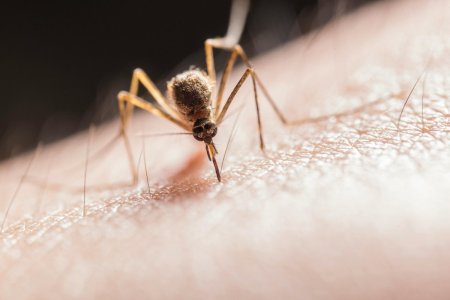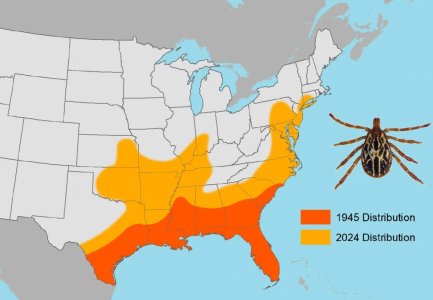Rare Parasite Outbreak: Is Your State Next? Northeast Case Sparks Widespread Panic!
By
Aubrey Razon
- Replies 0
The serene landscapes of the Northeast are facing an unseen invader, one that's as tiny as it is dangerous.
A rare parasitic illness has emerged in the Northeast, with experts warning that other states may be at risk. Stay informed on this developing health concern.
The culprit behind this health scare is the Gulf Coast tick, a blood-sucking parasite that's not just a nuisance but a carrier of the Rickettsia parkeri rickettsiosis bacteria.
This bacteria can cause a range of symptoms, including a telltale dark scab at the bite site, fevers, headaches, rashes, and muscle aches. If left untreated, the infection can become life-threatening.
A 29-year-old woman in Connecticut has become the first reported case of a rare parasite-borne illness in the region, and scientists are sounding the alarm that more states could be next.
The case in Connecticut is a wake-up call. The woman who was bitten by the Gulf Coast tick experienced the classic symptoms of R. parkeri rickettsiosis.
Fortunately, the tick was tested at a state facility, leading to a prompt diagnosis and treatment with antibiotics. The woman has since recovered, but the incident has left many wondering about the risks lurking in their own backyards.
Traditionally, Gulf Coast ticks have been confined to their namesake region. However, experts from Yale University and other institutions have noted their migration northward.
Dr. Goudarz Molaei, an associate clinical professor at the Yale School of Public Health, points to climate change as a significant factor in this shift. Warmer global temperatures, ecological changes, and human activities like reforestation and travel are facilitating the spread of these ticks and the pathogens they carry.
The expansion of tick populations is not limited to the Gulf Coast species. Native ticks, such as the blacklegged tick, are also moving into new territories due to climate change.
This migration is increasing the prevalence of tick-borne illnesses across the United States, including babesiosis, anaplasmosis, Powassan virus, and eastern equine encephalitis.
The Gulf Coast tick is easily identifiable by its ornate markings, with adult males sporting white lines and females featuring bright white markings on their dorsal shield. Despite their distinctive appearance, the threat they pose is anything but superficial.
With this alarming news, we encourage one another to take proactive steps to protect ourselves from these emerging threats. Here are some tips to keep in mind:
1. Be Tick Aware: When spending time outdoors, especially in grassy or wooded areas, wear long sleeves and pants, use insect repellent, and perform regular tick checks on yourself, your loved ones, and pets.
2. Know the Signs: Familiarize yourself with the symptoms of tick-borne illnesses. Early detection is crucial for effective treatment.
3. Create a Safe Environment: Keep your yard trimmed and clear of leaf litter where ticks thrive. Consider professional pest control if you live in a high-risk area.
4. Seek Prompt Medical Attention: If you find a tick on your body or experience symptoms after a tick bite, consult a healthcare provider immediately.
5. Stay Informed: Keep up with local health advisories and reports on tick activity in your area. You can also subscribe to our daily newsletter for health updates.
By staying informed and vigilant, we can continue to enjoy the beauty of the outdoors without falling victim to the tiny but formidable tick!

Have you encountered ticks in your area? Do you have additional tips for preventing tick bites? Share your experiences and advice in the comments below.
A rare parasitic illness has emerged in the Northeast, with experts warning that other states may be at risk. Stay informed on this developing health concern.
The culprit behind this health scare is the Gulf Coast tick, a blood-sucking parasite that's not just a nuisance but a carrier of the Rickettsia parkeri rickettsiosis bacteria.
This bacteria can cause a range of symptoms, including a telltale dark scab at the bite site, fevers, headaches, rashes, and muscle aches. If left untreated, the infection can become life-threatening.
The Northeast's First Case
A 29-year-old woman in Connecticut has become the first reported case of a rare parasite-borne illness in the region, and scientists are sounding the alarm that more states could be next.
The case in Connecticut is a wake-up call. The woman who was bitten by the Gulf Coast tick experienced the classic symptoms of R. parkeri rickettsiosis.
Fortunately, the tick was tested at a state facility, leading to a prompt diagnosis and treatment with antibiotics. The woman has since recovered, but the incident has left many wondering about the risks lurking in their own backyards.
The Spread of a Parasite
Traditionally, Gulf Coast ticks have been confined to their namesake region. However, experts from Yale University and other institutions have noted their migration northward.
Dr. Goudarz Molaei, an associate clinical professor at the Yale School of Public Health, points to climate change as a significant factor in this shift. Warmer global temperatures, ecological changes, and human activities like reforestation and travel are facilitating the spread of these ticks and the pathogens they carry.
The expansion of tick populations is not limited to the Gulf Coast species. Native ticks, such as the blacklegged tick, are also moving into new territories due to climate change.
This migration is increasing the prevalence of tick-borne illnesses across the United States, including babesiosis, anaplasmosis, Powassan virus, and eastern equine encephalitis.
The Gulf Coast tick is easily identifiable by its ornate markings, with adult males sporting white lines and females featuring bright white markings on their dorsal shield. Despite their distinctive appearance, the threat they pose is anything but superficial.
Protecting Yourself and Your Loved Ones
With this alarming news, we encourage one another to take proactive steps to protect ourselves from these emerging threats. Here are some tips to keep in mind:
1. Be Tick Aware: When spending time outdoors, especially in grassy or wooded areas, wear long sleeves and pants, use insect repellent, and perform regular tick checks on yourself, your loved ones, and pets.
2. Know the Signs: Familiarize yourself with the symptoms of tick-borne illnesses. Early detection is crucial for effective treatment.
3. Create a Safe Environment: Keep your yard trimmed and clear of leaf litter where ticks thrive. Consider professional pest control if you live in a high-risk area.
4. Seek Prompt Medical Attention: If you find a tick on your body or experience symptoms after a tick bite, consult a healthcare provider immediately.
5. Stay Informed: Keep up with local health advisories and reports on tick activity in your area. You can also subscribe to our daily newsletter for health updates.
By staying informed and vigilant, we can continue to enjoy the beauty of the outdoors without falling victim to the tiny but formidable tick!
Key Takeaways
- The first case of a rare parasite-borne illness caused by Rickettsia parkeri rickettsiosis has been reported in the Northeast, following a tick bite on a woman in Connecticut.
- Scientists warn that due to climate change and other factors, parasitic ticks such as the Gulf Coast tick are moving into new territories and could lead to an increase in tick-borne illnesses.
- The Gulf Coast tick, which can be identified by distinctive markings on its body, is the only known carrier of R. parkeri bacteria in the US and is associated with conditions including fevers, headaches, rashes, and potentially severe complications if not treated early.
- Tick populations are expanding into new areas for several reasons, including rising global temperatures and ecological changes, and health experts are urging awareness and preparedness for the associated health risks.
Have you encountered ticks in your area? Do you have additional tips for preventing tick bites? Share your experiences and advice in the comments below.








